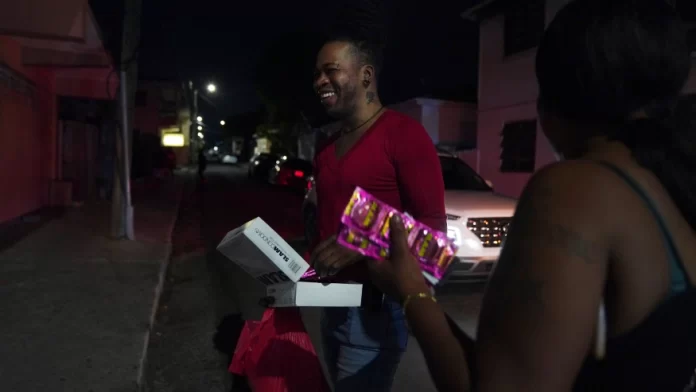For years, Orden David was persecuted in his native Antigua and Barbuda — a frequent complaint by many LGBTQ people who fear for their safety across the conservative and mostly Christian Caribbean, where anti-gay hostility is widespread.
David was bullied and ridiculed.
One time, a man stepped out of a car, made a comment about how a gay man was walking on the street late at night, then hit him in the head.
More recently, another stranger struck him in the face in broad daylight, knocking him out.
That’s when he had enough.
Facing ostracism and risking his life as the public face of the LGBTQ movement, David took his government to court in 2022 to demand an end to his country’s anti-sodomy law.
“I realized that with our community, we’ve gone through a lot and there’s no justice for us,” Orden told The Associated Press.
“We all have rights. And we all deserve the same treatment.”
Last year, a top Caribbean court ruled that the anti-sodomy provision of Antigua’s sexual offenses act was unconstitutional.
LGBTQ-rights activists say David’s effort, with the help of local and regional advocacy groups, has set a precedent for a growing number of Caribbean islands.
Since the ruling, St. Kitts & Nevis and Barbados, have struck down similar laws that often seek long prison sentences.
“It’s been a legal and historic moment for Antigua and Barbuda,” said Alexandrina Wong, director of the local non-governmental organization Women Against Rape, which joined the litigation coordinated by the Eastern Caribbean Alliance for Diversity and Equality.
“Our Caribbean governments are getting a good grip of what the world looks like and how we can reshape our history and … the future of the Caribbean people,” Wong said.
The ruling said Antigua’s 1995 Sexual Offences Act “offends the right to liberty, protection of the law, freedom of expression, protection of personal privacy and protection from discrimination on the basis of sex.”
Antigua and Barbuda Prime Minister Gaston Browne told the AP that his government decided not to challenge the ruling: “We respected the fact that there should be no discrimination within society,” he said.
“As a government, we have a constitutional responsibility to respect the rights of all and not to discriminate.”
The law stated that two consenting adults found guilty of having anal sex would face 15 years in prison.
If found guilty of serious indecency, they faced five years in prison.
Such laws used to be common in former European colonies across the Caribbean but have been challenged in recent years.
Courts in Belize and Trinidad and Tobago have found such laws unconstitutional; other cases in the region are pending.
Same-sex consensual intimacy is still criminalized in six Caribbean countries, according to Human Rights Watch and the London-based organization Human Dignity Trust.
The countries include Dominica, Grenada, Guyana, St. Lucia, St. Vincent and the Grenadines, and Jamaica, which some LGBTQ-rights groups consider the Caribbean nation most hostile to gay people.
“Governments in these jurisdictions should be pro-active and repeal these laws now, instead of waiting for members of the LGBT community to force legal change,” said Téa Braun, chief executive of Human Dignity Trust.
“With three successful judgments last year and further legal challenges in the Caribbean ongoing, it is only a matter of time before these laws fall across the region.”
Jamaica’s government has argued that it doesn’t enforce its 1864 anti-sodomy laws, but activists say keeping these laws on the books stokes homophobia and violence against the LGBTQ community in several Caribbean countries.
LGBT people in such countries, face “a constitution that criminalizes them on one end, and a religion that says they’re an abomination,” said Kenita Placide, executive director for The Eastern Caribbean Alliance for Diversity and Equality.
“It has created a culture of stigma and discrimination, which has now led to violence,” she said. “And in each of those countries, including Antigua, we’ve seen LGBT persons who’ve fled because of certain levels of violence.”
Growing up, Orden David was bullied in school and discriminated against outside its walls. People took photographs of him and posted them on social media, called him slurs and attacked him physically.
“What pushed me to go forward with this litigation case, to challenge the government, is that experience that I’ve gone through in life,” David said, adding that in 2019 he was knocked out by a stranger who hit him on the face while he was working in a hospital.
Discrimination against LGBTQ people persists in the Caribbean. Some conservative lawmakers and religious leaders oppose the abolition of anti-gay laws invoking God in their arguments and calling gay relationships a sin.
“I don’t think that God created man and woman to engage in that way,” said Bishop Charlesworth Browne, a Christian pastor who is president of the Antigua and Barbuda Council of Church Leaders.
For years, he has campaigned against easing the country’s anti-gay laws.
“It’s not just a religious issue. It’s a health issue,” Browne said.




